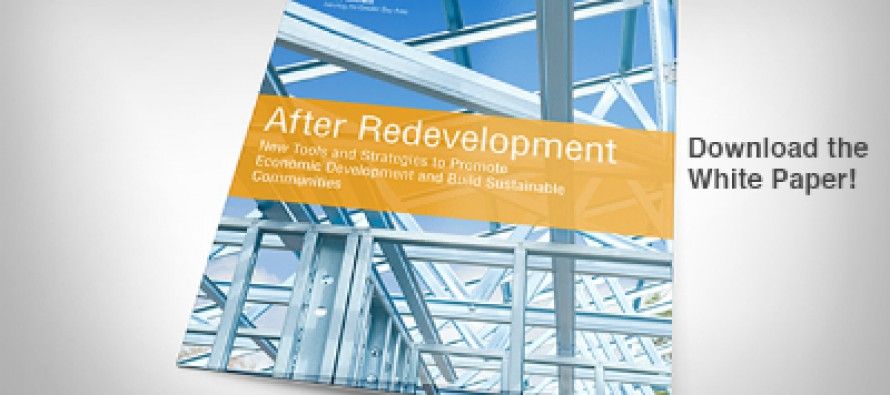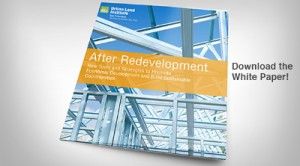Is bringing back redevelopment a good idea?

 The Urban Land Institute seeks to rebuild redevelopment in California. The essence of the proposal is that redevelopment should be good to go again if just some technical tweaks are made.
The Urban Land Institute seeks to rebuild redevelopment in California. The essence of the proposal is that redevelopment should be good to go again if just some technical tweaks are made.
But we’ve been there before.
California’s redevelopment law was repealed in 2011 largely because it was siphoning $1.5 billion a year away from the state general fund, including from schools. After the law’s repeal, municipal redevelopment agencies were closed and their remaining funds transferred to the state.
But property rights advocates also charged that redevelopment used eminent domain to take the property of homeowners and small businesses to give to “big box” stores with political clout.
Often the compensation was below market values, hurting the citizens to help wealthy developers.
By artificially pumping tax money into real estate, redevelopment also played a part in the housing bubble that led to the housing bust of 2007-09, from which Californians are still recovering, especially those in the state’s inland areas. Of course, there were other causes for the housing boom/bust, such as easy loans to those unable to make payments.
Having once been employed as an affordable housing development analyst for the Los Angeles County Community Development Commission and chief real estate appraiser for the Metropolitan Water District of Southern California acquiring land by eminent domain, I was interested to read the Urban Land Institute’s new 22-page proposal, titled, “After Redevelopment: New Tools and Strategies to Promote Economic Development and Build Sustainable Communities.”
Tweaking Doesn’t Address These Cases
Let me point out some serious issues not addressed in the ULI proposal from real world cases I have been writing about at Calwatchdog.com for some time. After that, I will examine the specifics of the ULI proposal.
- The City of Desert Hot Springs in Riverside County is considering bankruptcy due to budget insolvency caused in part by trying to create an economic base with retail development and affordable housing programs. In a city chock full of modest-priced housing and little industrial or business base to sustain incomes and home values, redevelopment was just a drug that that addicted the city to believing it had a stronger economic base than it actually had. Result: budget insolvency.
- In the City of San Francisco, the city has had to devise a policy of government-induced “gentrification” to provide middle-class ownership housing to new families migrating to jobs in high-tech companies. The city’s overkill rent control laws and the state’s anti-urban sprawl law, Assembly Bill 375, created an absurd situation. Landlords intentionally have pulled 10,000 apartment units off the market rather than rent them. Meanwhile, tenants in rent-controlled housing were being evicted for condo conversions for families where the head of household was employed in the booming high-tech industry, much of it in video games. The new condo conversions did not need redevelopment funding; they just needed deregulation to materialize. If redevelopment returns, the 20 percent of redevelopment funds set aside for affordable housing should not be allowed in cities with city-wide rent control. Rent control, if it is allowed to exist, should be staggered from one neighborhood to another for 10 years to increase the turnover of apartment units so that landlords will not keep units off the market.
- Since redevelopment agencies have been dissolved, the City of Ventura has gotten into the loan sharking business of providing tax-exempt private loan monies to casinos: no property taxes needed.
- Cities such as Richmond that seize loans on over-mortgaged properties to combat economic “blight” should not be granted new redevelopment powers.
- Many cities would be better off with de-development, which would bring back affordable mom and pop diners, used clothing stores, and barber shops in the place of the over-priced chain restaurants, luxury hair salons and health spas, high fashion clothing stores, and supermarkets staffed with union jobs that have priced goods and services out of the reach of those struggling to make ends meet.
- The 150 California cities with inclusionary housing ordinances don’t need to redevelop redundant affordable housing. Even Gov. Jerry Brown seems to agree.
There are many more such cases.
Proposal
The proposal by the Urban Land Institute doesn’t call for addressing any of the above crucial issues facing cities today. The ULI proposal merely wants to give newly organized redevelopment agencies the power to issue tax-exempt bonds with only a 55 percent vote of the people, instead of the current two-thirds vote required under Proposition 13.
The ULI doesn’t propose any reforms to “buy low-resell high” eminent domain laws that thwart the private assemblage of land. The proposal says this different kind of redevelopment no longer would siphon property taxes from public schools.
But it really wouldn’t end the practice many cities used of diverting their property tax increment funds from redevelopment away from public schools and into city coffers to pay for lucrative pensions for police and fire departments. The ULI proposal doesn’t address whether the revival of redevelopment would continue to be used to create a “public pension bubble.”
Below is an abbreviated table excerpted from the ULI proposal that compares the former redevelopment scheme, since repealed, with the ULI proposal. The ULI proposal calls for relaxing most of the provisions of the old redevelopment scheme as a cure-all.
But tweaking the provisions of the old redevelopment law won’t change the major problems caused by redevelopment in the first place, and which led to its repeal in California.
Brief Comparison of Recommended Program Tools
With Former Redevelopment Program:
Urban Land Institute, Nov. 2013
| Legal Authority & Tools | Recommended Program | Former Redevelopment Program | |
| Legal Authority | Special agency formation required | NO | YES |
| Exclusive authority | NO | YES | |
| Project area land use plan required | NO | YES | |
| Consistency with General Plan | YES | YES | |
| Powers | Property acquisition | YES, with eminent domain | YES, with eminent domain |
| Disposition of property for public or private use | YES | YES | |
| Negotiated pubic/private or joint development agreements | YES | YES | |
| Public financial participation & profit in projects | YES | YES | |
| Financing | Property tax increment financing & issuance of bonds | YES, only with consent of affected taxing entities & without share of property taxes to education. | YES. Without consent of affected taxing entities & limited only by redevelopment plan. |
| Burden on state | NO | Yes. Backfill on school funding | |
| Use of other sources of financing | YES | YES | |
| Local voter approved bonds | YES, 55% voter approval | Yes, 66% voter approval | |
| Procedures and Accounting | General level of complexity | Simplified(no consultants) | Complex(consultants needed) |
| Accountability | Simplified | Complex | |
| Required findings | YES | YES | |
| CEQA – California Environmental Quality Act | YES | YES |
Related Articles
CA GOP aims for demographic rebound
Convinced that expanding voter appeal is a make-or-break proposition, leading California Republicans have begun to pivot toward a broad-based demographic strategy
Elections offer lessons for California GOP
This post has been updated below. Yesterday, two states located thousands of miles from California elected new governors. And
Vive la Foie Gras Résistance!
Dec. 10, 2012 By John Hrabe In 2004, then-state Senate President Pro-Tem John Burton, D-San Francisco, coined a profane, albeit




